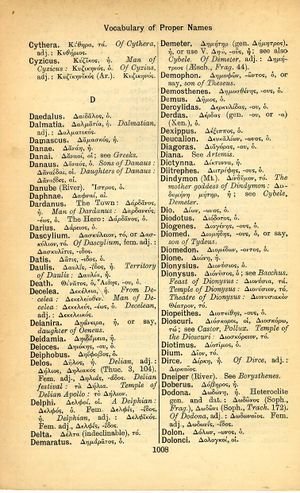Demosthenes
οὐ γὰρ ἂν τό γε πραχθὲν ἀγένητον θείη → since he cannot make what was done as though it had not come to pass
English > Greek (Woodhouse)
Δημοσθένης, -ους, ὁ.
Latin > English (Lewis & Short)
Dēmosthĕnes: is (
I gen. i, Cic. Opt. Gen. 5, 14), m., Δημοσθένης, the most celebrated of the Grecian orators, Cic. de Or. 1, 13; 20; id. Brut. 9; Prop. 3 (4), 21, 27; Quint. 10, 1, 76; 12, 10, 23 sq.; Juv. 10, 114 et saep.—Hence,
II Dēmosthĕnĭcus, a, um, adj., Demosthenic: Demosthenicum, quod ter primum ille vocavit (i. e. action), Aus. Prof. 1, 19.
Latin > French (Gaffiot 2016)
Dēmosthĕnēs,¹¹ is, m. (Δημοσθένης), Démosthène [le célèbre orateur grec] : Cic. de Or. 1, 89 ; 1, 260 || -nĭcus, a, um, de Démosthène : Aus. Prof. 1, 19. gén. ī, Cic. Opt. 14 ; acc. em ou ēn.
Latin > German (Georges)
Dēmosthenēs, is u. ī, Akk. em u. ēn, m. (Δημοσθένης), der berühmte athenische Redner aus dem Demos Päania, der Verteidiger der griechischen Freiheit gegen Philipp von Mazedonien, Cic. de or. 1, 260; de opt. gen. 14 (wo Genet. -i); Tusc. 4, 55. Quint. 10, 1, 76. Iul. Val. 2, 15 (2, 5, wo Genet. -i). Iuven. 10, 114. (Vgl. Neue-Wagener Formenl.3 1, 473 u. Keil de emend. Plin. ep. 1, p. 11 über den Akk. auf em u. en). – Dav. Dēmosthenicus, a, um, demosthenisch, Auson. prof. (XVI) 2, 19. p. 56, 14 Schenkl. – u. Dēmosthenicē, Adv. demosthenisch, Prisc. 15, 37.
Latin > English
Demosthenes Demosthenis N M :: Demosthenes; (Greek orator of 4th century BC)

